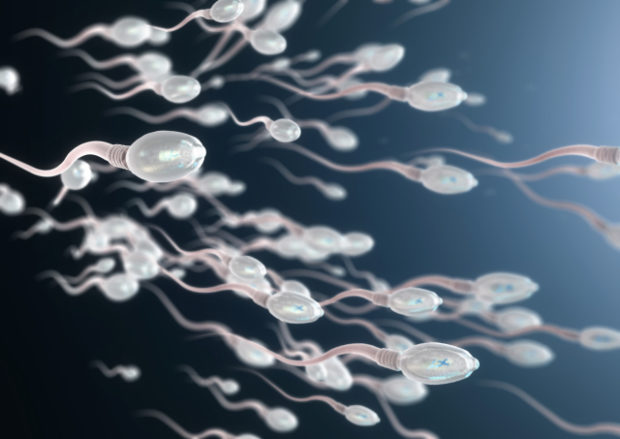Human sperm count dwindling, penis shrinking at alarming rate, scientist warns

Image: Istock.com/man_at_mouse via AFP Relaxnews
Amid the many global problems we are facing today, one of humanity’s biggest issues comes relatively unnoticed: the decline in reproductive health, especially for males.
Specifically, the sperm count of males in the West has significantly decreased by 59% between 1973 and 2011 due to chemicals found in everyday items, a study co-authored by Dr. Shanna Swan in 2017 has found.
In the study, which has been making headlines around the globe, scientists noted that sperm count is of considerable public health importance for several reasons including the decline of male fertility and the rise of other health issues, such as testicular cancer.
“If you look at the curve on sperm count and project it forward—which is always risky—it reaches zero in 2045,” Swan said in her new book titled “Count Down: How Our Modern World Is Threatening Sperm Counts, Altering Male and Female Reproductive Development, and Imperiling the Future of the Human Race,” as cited by Axios on Feb. 24.
In the book, Swan also noted that aside from the decline in sperm count, penis size and testes volume have been decreasing among humans in the past few decades.
“The current state of reproductive affairs can’t continue much longer without threatening human survival,” Swan writes in the book.
Swan has since doubled down on her warning via Scientific American on March 16, where she co-wrote with Stacey Colino that the decline in reproductive health is happening to females as well.
They found that reproductive problems in males have been increasing by 1 percent every year, while the miscarriage rate for females in the United States is also increasing by 1 percent annually.
Swan and Colino noted that while 1 percent may not seem like a big number to the public, it actually is as this means a 10% increase every decade and a 50% increase in just 50 years.
This increase in reproductive health problems is faster than the rate of global warming, but the public has not been as vocal or informed regarding the issue, which threatens humanity’s existence.
Hormone-altering chemicals
This decline in reproductive health is largely due to the hormone-altering chemicals found in items found all around us: from plastic containers, food packaging, water bottles to electronic devices, pesticides and many others.
These items contain chemicals such as phthalates, bisphenol A and flame retardants, among others. It is no coincidence that the decline in reproductive health began in the mid-20th century when these items started being produced in large numbers, the researchers noted.
“Exposure to these chemicals is especially problematic during pregnancy because what happens during pregnancy doesn’t stay in pregnancy. Rather, an expectant mother’s exposure to toxic chemicals in the air she breathes, the water she drinks, the foods she eats and the products she slathers on her skin can enter her body (and hence the fetus) and influence her baby’s reproductive development,” Swan and Colino explained.
“This is particularly true early in pregnancy—in what’s called the reproductive programming window—and it’s especially true for male babies,” they added.
Among the many health issues, these chemicals’ effect on reproductive health has also been associated with premature death.
The researchers urge humanity “to shift our collective focus” and prioritize demanding the replacement of the said chemicals from our everyday items with chemicals that do not affect our hormones.
” It’s also time to establish better testing methods and regulatory actions so that only safe chemicals can enter the market and our bodies. In other words, we need to stop using each other and our unborn children as lab rats for EDC exposures,” Swan and Colino stressed.
“The health and the future of the human race really do depend on it,” they added. Ian Biong /ra
RELATED STORIES:
Men who smoke before children are conceived could affect semen quality of adult sons
Being overweight or obese could lower the quality of men’s sperm, study finds